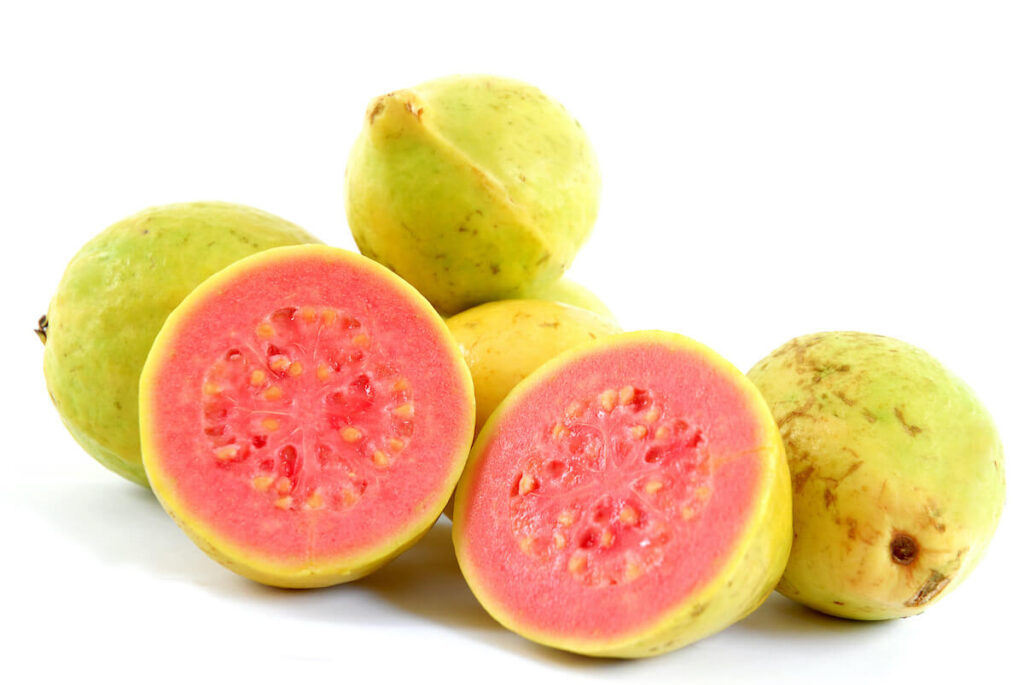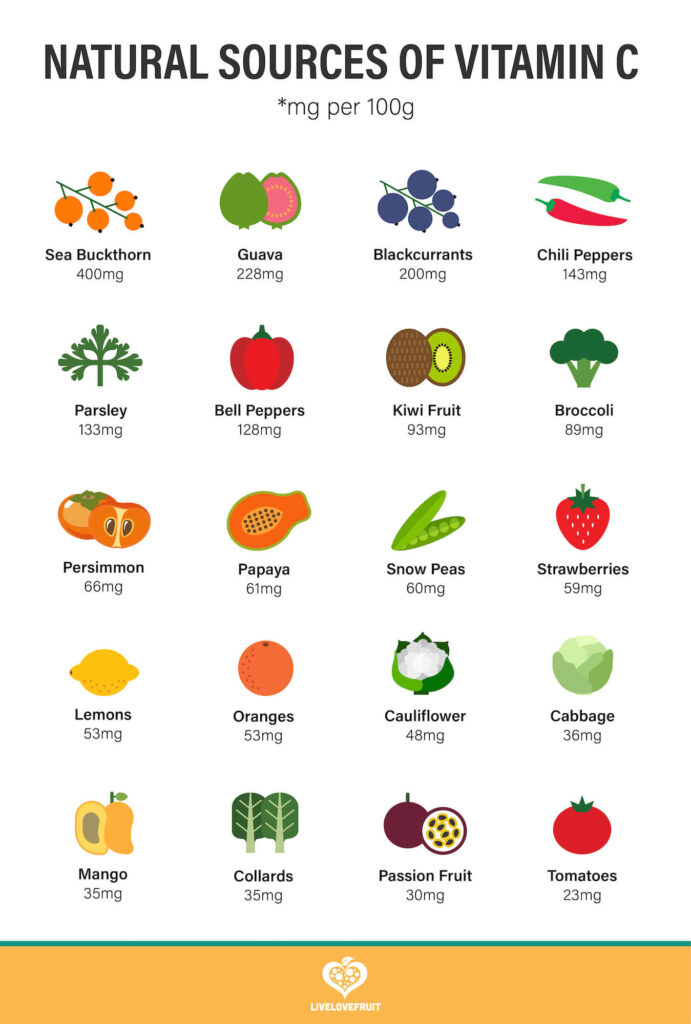
Hallo, good morning, on occasion will discussed something foods with vitamin c fruits Top 20 Natural Sources of Vitamin C to Boost Immunity and Fight Disease see in full

Vitamin C, or ascorbic acid, is one of the most important vitamins for immune health. But that’s not all this vitamin is famously known for.
This essential nutrient and powerful antioxidant helps support collagen synthesis, , provides support to the joints and so much more.
You can probably understand, then, why eating foods high in vitamin C is essential for supporting all parts of the body, inside and out.
The great thing about vitamin C is that you can’t over-do it.
So how much vitamin C do you need every day, and what are the key health benefits of including it in your diet? Let’s take a closer look…
What Is Vitamin C and Why Do We Need It?
Vitamin C, or L-ascorbic acid, is a water-soluble vitamin and antioxidant that cannot be synthesized by humans.
It is an essential cofactor in enzymatic reactions in the body, such as in the biosynthesis of collagen, carnitine, and neuropeptides, and in the regulation of gene expression.
Vitamin C can also help protect the health of your heart and boost the absorption of other nutrients (like iron) in the body.
A deficiency in vitamin C can wreak havoc on all parts of the body, causing symptoms like bumpy skin, easy bruising, fatigue, weakened immunity, bleeding gums, and even scurvy.
Because humans cannot synthesize vitamin C naturally, it must be consumed through diet. Including more foods high in vitamin C will not only improve your immune system, but it may also help reduce your risk of chronic disease.
Top Health Benefits of Vitamin C
Vitamin C has been widely regarded as essential to everyone’s nutrition for years now. This became increasingly obvious after sailors became victim of scurvy and other diseases linked to vitamin C deficiencies from lack of access to fresh fruit and vegetables.
As a strong antioxidant, vitamin C helps serve the body and its functions in multiple ways. Here are some of the top benefits of including more vitamin C rich foods into your diet:
1. Boosts Immunity
Vitamin C is a strong antioxidant, meaning that it helps protect the cells and limits the damage by stabilizing and eliminating free radicals. Studies have shown that consuming more vitamin C actually increases your blood antioxidant levels by up to 30% (.
In fact, one of the key signs of a vitamin C deficiency is a !
One review of 76 studies found that administering vitamin C intravenously could improve time to cancer relapse, reduce tumor size, enhance the quality of life, and decrease symptoms associated with chemotherapy (.
Other ways in which vitamin C may reduce one’s risk of developing cancer is by limiting the formation of carcinogens, like nitrosamines (.
2. Protects the Heart
As an antioxidant, vitamin C can help fight the oxidative damage of low-density lipoproteins, a major cause of cardiovascular disease (.
It can also help reduce risk factors associated with heart disease like high blood pressure, and high LDL (bad) cholesterol levels.
An analysis of 9 studies with a combined participant value of 293,172 found that after 10 years, those who took at least 700 mg of vitamin C per day had a 25% reduced risk of heart disease than those who didn’t supplement at all (.
Similarly, another study showed that taking just 500 mg of vitamin C daily significantly reduced LDL cholesterol by approximately 7.9 mg/dL and blood triglycerides by 20.1 mg/dL — two major risk factors for heart disease (.
3. Speeds Wound Healing
Vitamin C is required for the synthesis of collagen, the main structural protein in the extracellular matrix of various connective tissues in the body.
For this reason, vitamin C makes an excellent vitamin for helping speed wound healing in the body, aiding in tissue repair and regeneration.
According to some studies, supplementing with vitamin C can help speed the healing of wounds, but that taking too much beyond the threshold of absorption will result in excretion (.
4. Promotes Collagen Synthesis
To build more on the above, because vitamin C is essential in the synthesis of collagen, it is also necessary for proper joint and bone support and skin health.
A major study that looked at the diets of over 4,000 women found that consuming more high vitamin C foods was associated with a lower risk of skin wrinkles and dryness (.
.
Collagen is the foundation that bone mineralization is built on, so consuming enough vitamin C in your diet plays an important part in your bone health, too. Studies have found associations between increased vitamin C levels and greater bone density (.
5. Helps Prevent Iron Deficiency
If you’ve ever dabbled in vegetarianism or veganism, you’d be quick to discover that vitamin C plays an important part in enhancing iron absorption, particularly from sources that are difficult to absorb, like those from plant-based foods, into more easily absorbable forms (.
Consuming just 100 mg of vitamin C with meals may improve iron absorption by up to 67% (.
Iron is a major component of the hemoglobin found in your red blood cells, helping supply the cells throughout your body with oxygen. Without enough iron in your body, you may develop a condition called iron-deficiency anemia, which results in symptoms like dizziness, shortness of breath, and weakness.
Top 20 Vitamin C Foods
The best way to ensure you’re getting enough vitamin C is to include more vitamin C rich foods into your diet.
So what foods are the best natural sources of vitamin C? Use the list below as a general guide. Each number is calculated per 100 grams of each food type. The percentage daily value is determined using 60mg as the daily recommended amount of vitamin C intake each day:
- Sea Buckthorn: 400mg (667% DV)
- Guava: 228mg (380% DV)
- Blackcurrants: 200mg (333% DV)
- Chili Peppers: 143mg (238% DV)
- Parsley: 133mg (221% DV)
- Bell Peppers: 128mg (213% DV)
- Kiwi: 93mg (155% DV)
- Broccoli: 89mg (148% DV)
- Persimmon: 66mg (110% DV)
- Papaya: 61mg (102% DV)
- Snow Peas: 60mg (100% DV)
- Strawberries: 59mg (98% DV)
- Lemons: 53mg (88% DV)
- Oranges: 53mg (88% DV)
- Cauliflower: 48mg (80% DV)
- Cabbage: 36mg (60% DV)
- Mango: 35mg (60% DV)
- Collards: 35mg (60% DV)
- Passion Fruit: 30mg (50% DV)
- Tomatoes: 23mg (38% DV)
Is Liposomal Vitamin C Better Than Natural Vitamin C?
While it is advised to get your vitamin C naturally from food, a lot of the vitamins and minerals present in many foods today are in levels that are much lower than what they used to be. This is all thanks to poor farming practices and nutrient degradation in the soil.
If you consume a lot of fruit and vegetables (as in, you’re a plant-based vegan and focus heavily on plant foods and minimal to no processed foods), then your vitamin C levels are likely okay, but for the average person, sometimes eating a few servings of fruit and vegetables each day simply is not enough to keep C levels high.
If you’re looking to take your immunity to another notch, or want to really focus on and activate collagen synthesis (like if you’re concerned about aging/wrinkles), my advice would be to continue upping your fruit and vegetable uptake, while also investing in a high-quality liposomal vitamin C supplement.
I am personally always working on strengthening my immunity, based on a history of major antibiotic and drug use. I’ve found that using the is one of the best-formulated vitamin C products out there.
The is a revolutionary breakthrough in vitamin c supplementation. Nano-sized micelles, encased and protected in liposomes, travel through the digestive tract and make their way into the lower gut, for superior absorption. This increases total bioavailability, comparable to vitamin C I.V. injection.
The flavor of this product is also out of this world. It quite literally tastes like an orange creamsicle – no jokes! Plus, there are no synthetic flavors, preservatives, or weird chemicals.
If you’re interested in boosting your immunity, or want to support better skin and collagen production in the body, you can !
How Much Vitamin C Do I Need?
So how much vitamin C is recommended to boost your overall health? Your needs will depend on a variety of factors, like age and gender, or if you’re pregnant or breastfeeding. Use the following guidelines to determine where you fall:
The for vitamin C is as follows:
For infants:
- 0–6 months: 40 mg/day
- 7–12 months: 50 mg/day
For children:
- 1–3 years: 15 mg/day
- 4–8 years: 25 mg/day
- 9–13 years: 45 mg/day
For adolescents:
- Girls 14–18 years: 65 mg/day
- Pregnant teens: 80 mg/day
- Breastfeeding teens: 115 mg/day
- Boys 14–18 years: 75 mg/day
For adults:
- Men age 19 and older: 90 mg/day
- Women age 19 years and older: 75 mg/day
- Pregnant women: 85 mg/day
- Breastfeeding women: 120 mg/day
If you smoke, or if you’re exposed to secondhand smoke, you should also increase your daily recommended intake by 35 mg/day to help meet your vitamin C needs.
Vitamin C Deficiency
If you’re not getting enough vitamin C in your diet, your health is already likely suffering as a result. Severe vitamin C deficiencies can result in things like scurvy, a disease that results from the breakdown of collagen and produces symptoms like bruising, bleeding gums and fatigue.
If you’re deficient in vitamin C, then you may suffer from the following symptoms:
- Inflammation of the gums (also called gingivitis)
- Slow wound healing
- Dry, brittle hair
- Rough, dry skin
- Weak immune system
- Swollen and painful joints
- Easy bruising
- Nosebleeds
- Digestive disorders like leaky gut
If you’ve been vitamin C-deficient for awhile, then you may experience long-term symptoms of vitamin C deficiency such as:
- High blood pressure
- Stroke
- Gallbladder disease
- Cancer
- Atherosclerosis
The Bottom Line
Getting enough vitamin C in your diet is as simple as consuming more foods that are high in vitamin C. This vitamin is a powerful antioxidant that helps boost immunity, protect the heart, speed wound healing and more.
While natural sources of vitamin C are a great place to up your levels, you might want to consider a liposomal vitamin C supplement if the fruits and veggies you’re eating come from conventional (non-organic) farms or if your immune system is compromised.
Not enough vitamin C in the diet can result in things like easy bruising, inflamed gums, dry and brittle hair and slow wound healing. By eating enough of the proper foods, you can easily over come a deficiency in this vitamin.

Oke discussion the subject Top 20 Natural Sources of Vitamin C to Boost Immunity and Fight Disease hopefully writing this helpful thank you
Articles this was posted on tag
Comments
Post a Comment